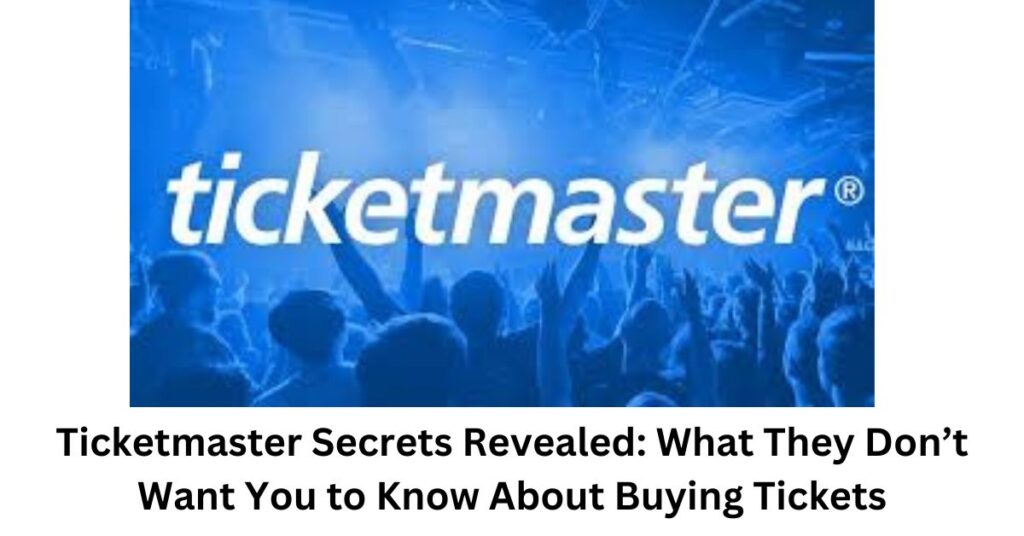Ticketmaster: The Giant Behind Your Favorite Concert Tickets
Let’s be real—when you think of buying concert tickets, sporting events, or that must-see Broadway show, the name Ticketmaster is probably the first thing that comes to mind. But have you ever wondered how this ticketing giant came to dominate the industry? Or why people have a love-hate relationship with it? Let’s peel back the curtain and take a closer look.
What Is Ticketmaster?
Ticketmaster is a global ticket sales and distribution company that connects event organizers with fans. Founded in 1976, it started as a humble venture, but over the years, it’s grown into one of the most recognized names in the live event industry. Whether it’s a Beyoncé concert or your local theater production, Ticketmaster is likely in the mix.
But here’s the kicker—it’s not just a platform to snag tickets. Ticketmaster is also a major player in ticket resale, event promotion, and venue management. Think of it as the Swiss Army knife of event ticketing.
How Ticketmaster Became the Industry Giant
It didn’t happen overnight. Ticketmaster’s rise to fame came through a mix of innovation, partnerships, and, let’s face it, a bit of controversy.
Early Days of Innovation
Back in the day, buying tickets was a hassle. You had to physically go to the venue or stand in long lines. Ticketmaster changed the game by introducing electronic ticketing systems, which made purchasing faster and more convenient. Imagine moving from mailing a check to clicking a button—that’s the leap Ticketmaster brought.
Mergers and Acquisitions
In 2010, Ticketmaster merged with Live Nation, creating a behemoth that dominates live events. This partnership gave Ticketmaster access to a massive network of artists, venues, and promoters, solidifying its grip on the industry.
Why Do People Love Ticketmaster?
Let’s give credit where it’s due—Ticketmaster isn’t all bad. For many, it’s a one-stop shop for live events. Here’s why some folks love it:
Convenience at Your Fingertips
You can browse events, choose your seats, and pay—all in one app. Plus, Ticketmaster’s digital tickets mean no more worrying about losing that little paper stub.
Verified Tickets
Scalpers and fake tickets? No thanks. Ticketmaster’s Verified Tickets system ensures you’re getting the real deal, so you won’t be turned away at the gate.
Exclusive Access
Ticketmaster often provides presales and VIP packages, letting fans snag tickets before they’re available to the general public. It’s like having a backstage pass to the ticket-buying process.
The Dark Side of Ticketmaster: Why the Hate?
Okay, so here’s where things get spicy. For all its perks, Ticketmaster has faced plenty of criticism. Let’s dig into the not-so-great stuff.
Service Fees That Make You Cry
Ever noticed how your $50 ticket magically turns into $75 at checkout? Those dreaded service fees are a major gripe. Critics argue that these fees are often excessive and lack transparency. It’s like finding out your fast-food combo doesn’t include fries—you feel a bit duped.
Limited Competition
Ticketmaster’s merger with Live Nation created what many call a monopoly. With so few alternatives, fans and event organizers often have no choice but to play by Ticketmaster’s rules.
Scalping and Resale Woes
While Ticketmaster tries to combat scalping, its resale platform can sometimes feel like a double-edged sword. Tickets often get snatched up by bots and resold at astronomical prices. The result? Fans are left scrambling—or broke.
Tips for Navigating Ticketmaster Like a Pro
Ticketmaster can be a jungle, but with a few tricks, you can come out on top.
1. Set Alarms for Presales
Presales are your golden ticket. Sign up for newsletters or follow your favorite artists to get the scoop on early access.
2. Use Multiple Devices
When a big event goes on sale, the website can get slammed. Use your phone, tablet, and laptop simultaneously for the best chance at snagging seats.
3. Be Quick but Smart
Once you’re in, don’t overthink it. Grab those tickets fast—but double-check your selections before paying. You don’t want to end up with seats behind a pillar.
What’s Next for Ticketmaster?
The future of Ticketmaster is all about innovation. From mobile-only ticketing to integrating AI for better seat recommendations, the company is constantly evolving. However, it will need to address ongoing concerns about pricing and transparency if it wants to win back the hearts of frustrated fans.
Conclusion: Love It or Hate It, Ticketmaster Is Here to Stay
Ticketmaster might not be perfect—okay, it’s far from perfect—but it’s undeniably a powerhouse in the world of live entertainment. Whether you’re jamming out to your favorite band or cheering for your home team, chances are Ticketmaster had a hand in making it happen.
So, what’s your take? Is Ticketmaster a necessary evil, or do you think the industry needs a shake-up? Either way, next time you buy a ticket, you’ll know a bit more about the story behind the screen.
Ticketmaster: The Good, The Bad, and the Tickets
When was the last time you planned a night out to see your favorite artist or team? Chances are, your first stop was Ticketmaster. It’s the go-to for millions of event-goers, but why does it feel like such a love-hate relationship? Let’s break down Ticketmaster—how it works, why it’s massive, and why it leaves people frustrated and yet still coming back for more.
What Exactly Is Ticketmaster?
Ticketmaster isn’t just your average ticketing company. It’s the ticketing company, connecting fans to live entertainment worldwide. From concerts to sports games, Broadway shows to comedy nights, Ticketmaster has been the main stage since 1976.
In simple terms, it’s the middleman between event organizers and fans. But unlike your friendly local scalper (don’t trust them), Ticketmaster offers a tech-driven, legit platform that handles everything from ticket sales to resale.
How Did Ticketmaster Get So Big?
Ticketmaster’s journey to ticketing domination wasn’t just about being good at selling tickets—it’s a masterclass in business growth.
The Innovation That Changed the Game
Before Ticketmaster, ticket-buying was a chore. You had to show up physically or call a box office, and let’s face it, nobody misses those long lines or waiting on hold. Ticketmaster revolutionized the process with online ticket sales, putting the box office in your pocket.
The Power of Partnerships
By partnering with major venues, promoters, and artists, Ticketmaster locked down its position as the go-to service. When you control both the artists and the arenas, it’s hard for competitors to step in.
The Live Nation Merger
In 2010, Ticketmaster merged with Live Nation, a huge event promotion company. Think of it as if Amazon decided to team up with UPS—they now control not just the delivery, but the entire experience. This merger turned Ticketmaster into an unstoppable force but also stirred controversy over its monopoly-like power.
Why People Can’t Get Enough of Ticketmaster
There’s a reason Ticketmaster continues to dominate despite criticism: it delivers on convenience.
One-Stop-Shop for Events
Imagine scrolling through concerts, sports, and theater all in one app. It’s like a buffet where every dish is your favorite. You get to see event details, seat options, and prices all in one go.
Digital Tickets
Gone are the days of stuffing paper tickets into your wallet (or losing them altogether). With mobile tickets, your phone becomes your entry pass.
Exclusive Access for Superfans
Love presales? VIP packages? Ticketmaster often lets fans score tickets before the general public. Sure, it’s not always fair, but it’s a lifesaver for diehard fans.
Ticketmaster’s Dark Side: Why All the Hate?
As much as Ticketmaster makes life easier, it’s far from perfect. For every satisfied customer, there’s someone shaking their fist at the sky.
The Dreaded Service Fees
You know the drill: you find a $100 ticket, but at checkout, it’s $125. Why? Service fees, processing fees, facility charges—whatever they want to call it, they sting. These extra costs often feel arbitrary, leaving fans wondering, What am I even paying for?
Scalping Bots and Resale Markups
While Ticketmaster tries to curb scalpers with Verified Fan programs, bots often scoop up tickets in seconds. These tickets end up on resale sites (sometimes even Ticketmaster’s own platform) for double or triple the price. It’s like fighting a Hydra—cut one head, and two grow back.
Monopoly Complaints
With its merger with Live Nation, Ticketmaster essentially controls the ticketing industry. Critics argue this lack of competition leads to high fees, poor customer service, and little incentive to improve.
Tips for Beating the System (Or at Least Trying)
Feeling like David against Goliath? Here’s how to increase your odds when buying tickets on Ticketmaster:
1. Prep for Presales
Sign up for fan clubs, newsletters, and Verified Fan programs. Being early gives you a head start before the rush.
2. Join the Queue Early
Log in before tickets go on sale. When the clock strikes, you’ll already be in line while others are just waking up.
3. Avoid Ticket Resellers If Possible
Stick to official sales and resale platforms. It’s tempting to go to third-party sellers, but you could end up with counterfeit tickets.
4. Have Backup Options
If your preferred section sells out, don’t panic. Grab what you can and aim for an upgrade later.
Ticketmaster vs. Competitors: Is There Another Way?
Ticketmaster’s dominance doesn’t mean it’s the only option. Competitors like StubHub, SeatGeek, and Eventbrite offer alternatives, but they don’t always have the same inventory. Think of them as mom-and-pop stores compared to Ticketmaster’s Walmart-level selection.
StubHub
Great for resale but often pricey. It’s where fans turn when Ticketmaster sells out.
SeatGeek
User-friendly and transparent, SeatGeek rates ticket prices so you know if you’re getting a good deal.
Eventbrite
Better for smaller events and indie productions. Don’t expect to find Taylor Swift tickets here, though.
What’s Ticketmaster Doing About the Criticism?
Ticketmaster isn’t ignoring the backlash. They’ve introduced Verified Fan programs to combat bots and fake tickets and are experimenting with dynamic pricing to better reflect demand. But let’s be real—these changes feel like putting a Band-Aid on a bullet wound.
If Ticketmaster really wants to win fans back, it’ll need to tackle those fees and scalping issues head-on.
Conclusion: Is Ticketmaster Friend or Foe?
At the end of the day, Ticketmaster is both a hero and a villain. It’s the platform we rely on to access unforgettable experiences, but it also comes with frustrations that leave fans feeling cheated.
So, next time you’re buying tickets, take a deep breath, brace yourself for the fees, and remember—you’re not alone in the struggle. Whether you’re singing along at a concert or cheering in the stands, Ticketmaster is just part of the ride. And hey, love it or hate it, at least it’s not making us line up at box offices anymore.


